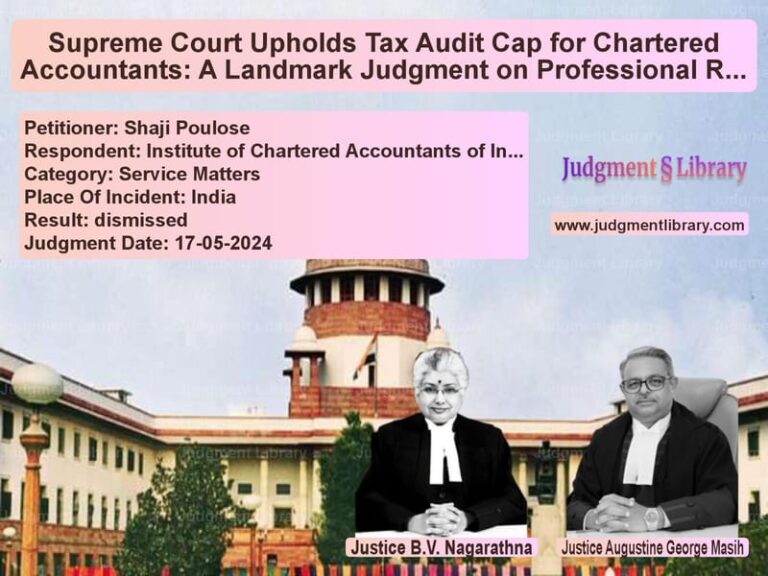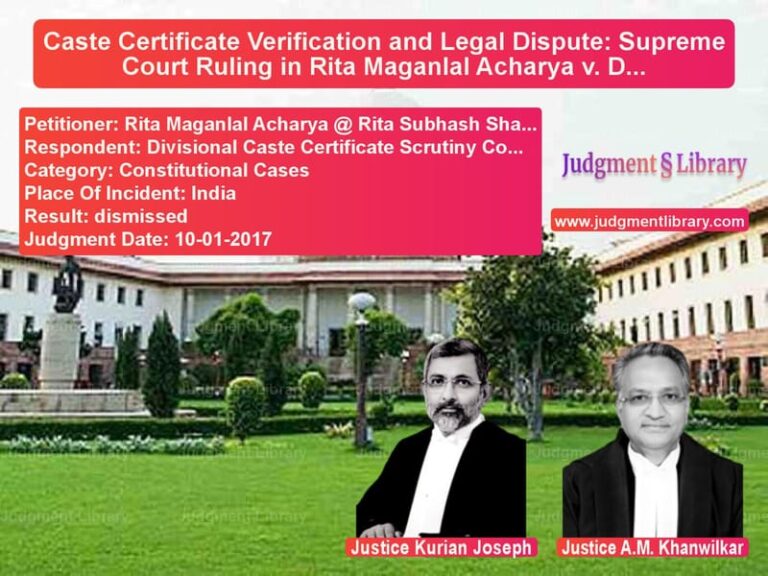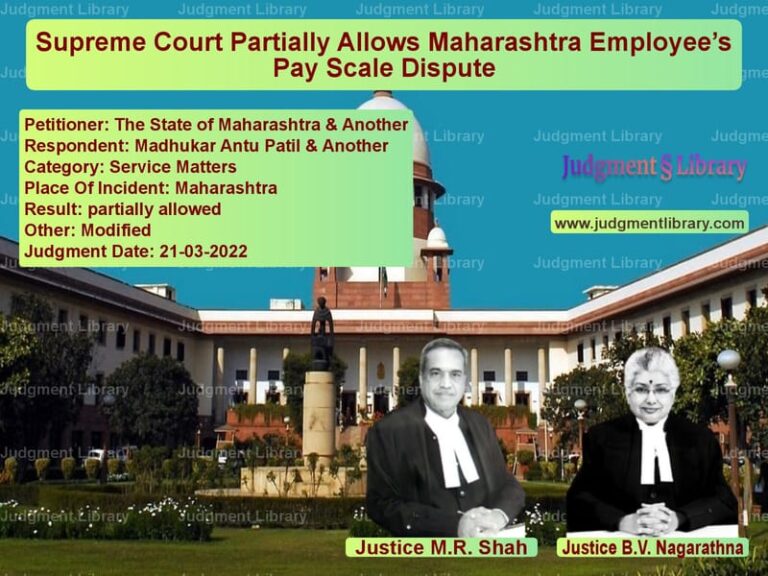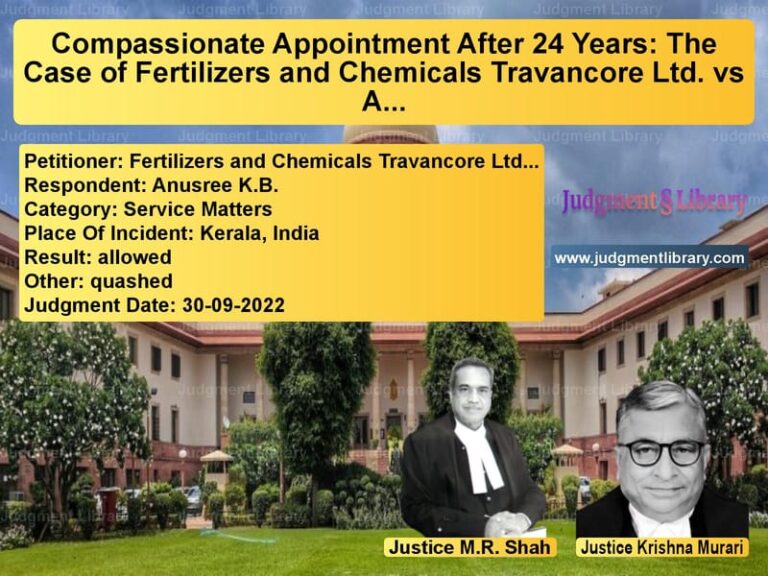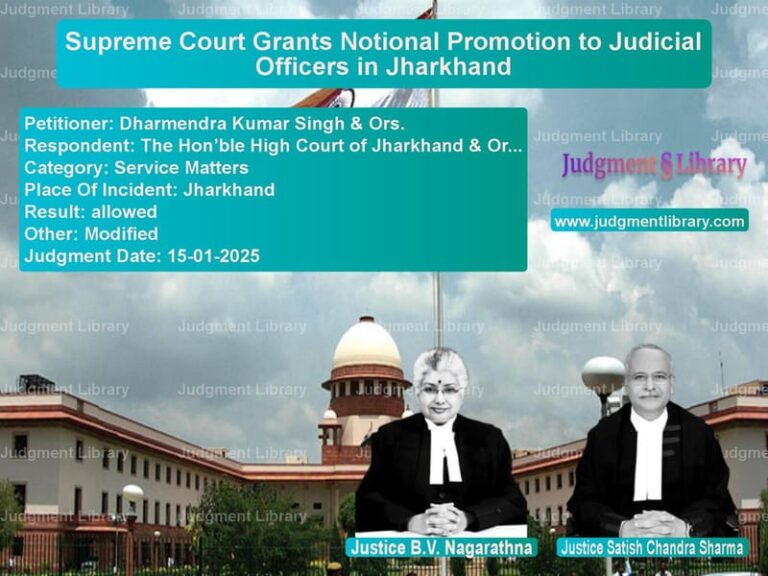Vicarious Liability in Criminal Law: Supreme Court Restores Conviction in Madhya Pradesh Murder Case
The case of State of Madhya Pradesh vs. Killu @ Kailash & Ors. is a landmark judgment on the principles of vicarious liability under Section 149 of the Indian Penal Code (IPC). This case provides significant insight into the legal doctrine that holds members of an unlawful assembly accountable for crimes committed in furtherance of a common objective. The Supreme Court of India reinstated the conviction of three accused individuals whose acquittal by the High Court was found unjustified. This detailed analysis covers the background of the case, the arguments presented by both parties, the court’s reasoning, and the implications of the judgment.
Background of the Case
The case arose from a gruesome murder that occurred on the night of May 23, 2005, in the state of Madhya Pradesh. The prosecution alleged that a group of five men stormed into the house of Balaprasad Pathak, the deceased, and attacked him while he was sleeping with his family members.
According to the prosecution, the accused individuals were:
- Himmu @ Hemchand – Armed with an axe
- Khushiram – Armed with an axe
- Killu @ Kailash – Armed with a lathi
- Devendra – Armed with a Ballam
- Kailash Nayak – Armed with a lathi
The prosecution alleged that Himmu @ Hemchand and Khushiram delivered fatal blows with their axes, resulting in severe head and chest injuries to the deceased, leading to his instant death. The other three accused, Killu @ Kailash, Devendra, and Kailash Nayak, were present at the scene and armed, but no direct injuries were attributed to them.
Trial Court’s Verdict
After considering the evidence, including eyewitness testimonies from the deceased’s wife and son, the Trial Court found all five accused guilty of murder under Section 302 IPC read with Section 149 IPC. The court concluded that all the accused formed an unlawful assembly with a common object to kill the victim, and their collective presence made them equally culpable. The Trial Court sentenced them to life imprisonment and imposed a fine.
High Court’s Acquittal of Three Accused
The accused appealed to the High Court of Madhya Pradesh, which partially overturned the Trial Court’s decision. The High Court found that while Himmu @ Hemchand and Khushiram were directly responsible for inflicting fatal injuries, there was no conclusive evidence that Killu @ Kailash, Devendra, and Kailash Nayak participated in the attack beyond mere presence.
The High Court ruled that the prosecution failed to establish that these three accused individuals actively contributed to the crime. Consequently, their conviction under Section 149 IPC was overturned, and they were acquitted.
Appeal to the Supreme Court
Aggrieved by the acquittal of three accused, the State of Madhya Pradesh challenged the High Court’s decision in the Supreme Court. The primary question before the Supreme Court was:
Did the presence of the three accused at the crime scene, armed with weapons, make them vicariously liable under Section 149 IPC?
Arguments by the Prosecution
The prosecution, representing the State of Madhya Pradesh, argued that:
- All accused entered the house together with weapons, which clearly demonstrated a premeditated plan.
- The accused did not disperse or attempt to prevent the crime but actively participated in the unlawful assembly.
- The High Court erred in assuming that the three accused did not contribute to the murder simply because they did not deliver direct blows.
- Under Section 149 IPC, all members of an unlawful assembly are equally liable for crimes committed in pursuance of the common object.
Arguments by the Defense
The defense for the acquitted accused countered that:
- Mere presence at the scene does not establish their intent to commit murder.
- There was no forensic or medical evidence linking them directly to the fatal injuries.
- The High Court rightly gave them the benefit of doubt, as they were not shown to have inflicted any injuries.
Supreme Court’s Ruling
The Supreme Court bench, consisting of Uday Umesh Lalit and Indu Malhotra, ruled in favor of the prosecution and reinstated the conviction of the three accused. The key observations made by the Court were:
“The presence of the respondents in the house of the deceased; the fact that they were armed; the fact that all of them had entered the house around midnight and further fact that two out of those five accused used their deadly weapons to cause the death of the deceased was sufficient to attract the principles of vicarious liability under Section 149 IPC.”
The Court reasoned that participation in an unlawful assembly itself is enough to establish criminal liability. The ruling cited the landmark case Masalti v. State of U.P., which upheld the principle that:
“If a person is a member of an unlawful assembly, he shares the responsibility for the actions committed in furtherance of the common objective.”
Implications of the Judgment
This judgment reinforces the doctrine of vicarious liability in criminal law. The ruling has the following implications:
- It clarifies that mere presence in an unlawful assembly with a common objective is enough to attract liability.
- The ruling strengthens the application of Section 149 IPC in group crimes.
- The decision ensures that all perpetrators of a violent crime are held accountable, even if they did not directly execute the act.
Conclusion
The Supreme Court’s decision in State of Madhya Pradesh vs. Killu @ Kailash & Ors. is a landmark ruling in criminal jurisprudence. It upholds the principle that vicarious liability under Section 149 IPC applies to all members of an unlawful assembly, regardless of their individual roles. The ruling ensures that individuals involved in premeditated group crimes cannot escape liability by merely claiming they did not actively participate.
By reinstating the life sentence for the acquitted accused, the Supreme Court has reinforced the importance of collective responsibility in criminal law and ensured justice for the victim, Balaprasad Pathak.
Petitioner Name: State of Madhya Pradesh.Respondent Name: Killu @ Kailash & Ors..Judgment By: Justice Uday Umesh Lalit, Justice Indu Malhotra.Place Of Incident: Madhya Pradesh.Judgment Date: 19-11-2019.
Don’t miss out on the full details! Download the complete judgment in PDF format below and gain valuable insights instantly!
Download Judgment: State of Madhya Prad vs Killu @ Kailash & Or Supreme Court of India Judgment Dated 19-11-2019.pdf
Direct Downlaod Judgment: Direct downlaod this Judgment
See all petitions in Murder Cases
See all petitions in Bail and Anticipatory Bail
See all petitions in Judgment by Uday Umesh Lalit
See all petitions in Judgment by Indu Malhotra
See all petitions in allowed
See all petitions in supreme court of India judgments November 2019
See all petitions in 2019 judgments
See all posts in Criminal Cases Category
See all allowed petitions in Criminal Cases Category
See all Dismissed petitions in Criminal Cases Category
See all partially allowed petitions in Criminal Cases Category


